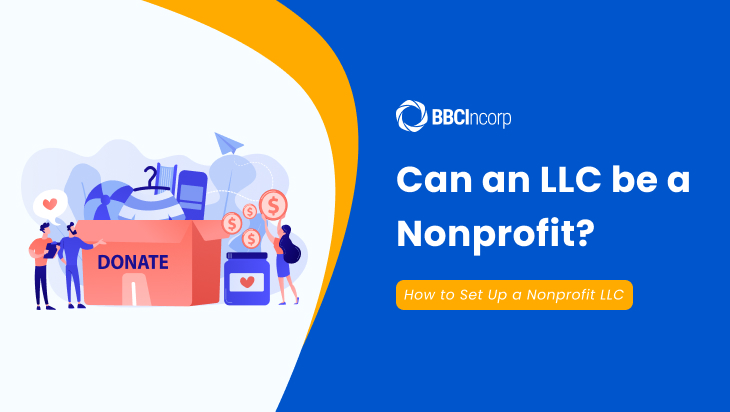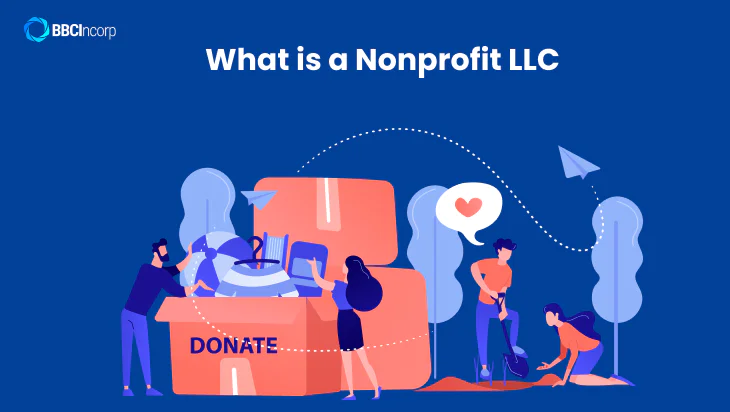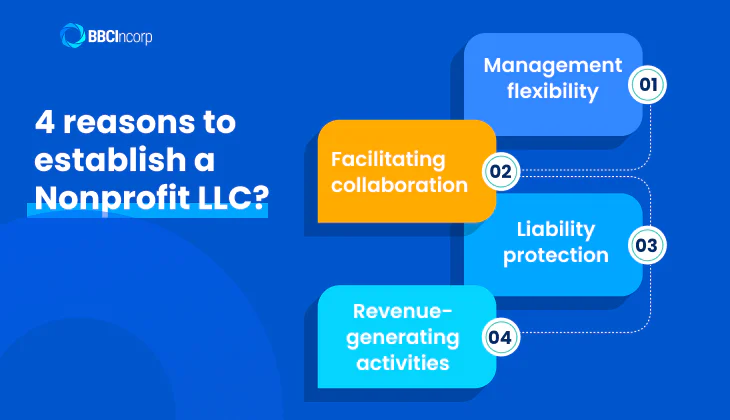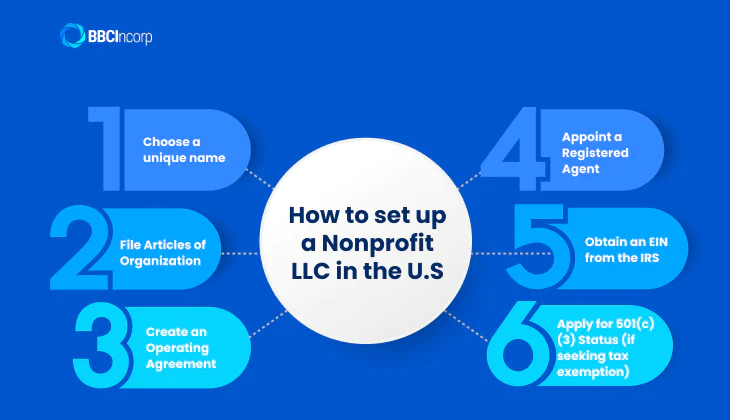
Table of Contents
Faced with intensifying social and environmental challenges, from climate change to economic inequality, entrepreneurs are increasingly motivated to drive change. Innovative business structures are therefore essential. While traditional structures remain dominant, Limited Liability Companies (LLCs) provide flexibility and liability protection as a legal entity.
This raises a key question: Can an LLC be a nonprofit? Exploring this possibility could lead to hybrid models, merging LLC agility with a strong social mission, to powerfully address pressing global issues. Hence, a solid understanding of this process is vital for those looking to incorporate a nonprofit LLC.
What is a Nonprofit LLC
To understand what a nonprofit LLC is, you must first grasp the core concept of a nonprofit organization.
Understanding the concept of a Nonprofit
A nonprofit organization is an entity formed to serve a public good, rather than to generate profit for its owners or members. These organizations play a vital role in society, addressing a wide range of needs. The Internal Revenue Service (IRS) outlines several categories of purposes that qualify an organization for nonprofit status, including:
- Charitable
- Educational
- Religious
- Scientific
- Literary
It’s crucial to emphasize that the defining characteristic of a nonprofit is its commitment to a mission that benefits the public, not private interests. Nonprofits can and do generate revenue, but this revenue must be reinvested into the organization. No profits are distributed to individuals who control or own the organization.
In many cases, these organizations can apply for tax-exempt status, which further enables them to dedicate more resources to their intended purpose.

Nonprofit LLC defined
What is an LLC? A traditional LLC is a business structure combining the pass-through taxation of a partnership or sole proprietorship, with the limited liability of a corporation. Members are generally not personally liable for company debts. In addition, profits and losses pass through to their individual tax returns.
A nonprofit LLC is formed explicitly to further a social or charitable mission. While retaining the liability protection of a traditional LLC, its activities and income must align with its nonprofit purpose: reinvestment into programs and operations, not distribution to members.
Essentially, it’s an LLC adhering to the operational and purpose restrictions of nonprofit status. Moreover, its recognition and requirements may vary by state.
Can an LLC be a Nonprofit?
Technically, yes, but it’s complex. An LLC can operate with a charitable purpose and undertake nonprofit activities, but achieving federal tax exemption as a 501(c)(3) organization is more involved than with a traditional nonprofit corporation.
To understand this complexity, let’s define 501(c)(3) status. This is a federal tax exemption under section 501(c)(3) of the Internal Revenue Code that allows an organization to operate without paying federal income tax, and to receive tax-deductible donations.
In the U.S., the IRS typically grants 501(c)(3) status to corporations, not LLCs. For an LLC to qualify for the status, its members must generally be other tax-exempt organizations or government entities. Its operating agreement must also contain specific language aligning with the section’s requirements, including strict purpose limitations, asset dedication clauses, and restrictions on income distribution.
Some states, including California, Texas, and Minnesota, require LLCs to be formed as a prerequisite to business profits. Can an LLC be non-profit in other states? They may allow it but mandate that incorporation documents mirror nonprofit legal standards.
Consequently, most founders find the corporate structure more straightforward when pursuing nonprofit status. However, an LLC can be a viable option in certain situations, such as collaborative ventures between existing nonprofit entities.
Why form a Nonprofit LLC?
The formation of a nonprofit LLC, while not an easy task, offers distinct advantages. Here’s a focused look at why an organization might select this structure:
Management flexibility
Compared to traditional nonprofit corporations, nonprofit LLCs provide greater management flexibility. LLCs aren’t bound by rigid governance rules, such as mandated boards with detailed roles and meeting schedules. This facilitates streamlined decision-making, quicker responses to changing circumstances, and reduced administrative burdens, especially for smaller organizations.
Facilitating collaboration
A nonprofit LLC is a valuable tool for collaboration between existing nonprofit entities. In order to pool resources, share expertise, and collaborate on joint programs, can a limited liability company be a non-profit? Often, it is used to accomplish these goals.
The structure helps formalize partnerships, clarify roles, and foster accountability, permitting each participating nonprofit to maintain its separate identity and overall mission.
Liability protection
Like traditional LLCs, nonprofit LLCs foster limited liability protection for their members. Individuals involved with the organization are generally shielded from its debts and legal liabilities.
Revenue-generating activities
A nonprofit LLC structure can, in some cases, provide more maneuverability for pursuing revenue-generating activities that support the organization’s mission.
However, you must ask yourself if “Can an LLC be nonprofit?” applies to your situation. Nonprofits must adhere to strict rules regarding unrelated business income (UBI). Meanwhile, an LLC allows a clearer separation of these activities from core nonprofit functions.
You might wonder, “Can I have an LLC and a nonprofit?” The answer is yes. It’s possible to have both: either as two separate entities or as a single LLC with a nonprofit purpose.

Navigating the requirements for Nonprofit LLC
Creating an LLC requires compliance with strict legal and tax requirements that vary by jurisdiction. Listed below are some of the most important considerations you may need.
In the United States
The Internal Revenue Service (IRS) allows an LLC to be recognized as a 501(c)(3) tax-exempt organization, but only under very specific conditions. These are detailed in the IRS document Limited Liability Companies as Exempt Organizations and include the twelve main rules:
- The LLC’s organizational documents must state that its activities are limited to one or more exempt purposes as defined under section 501(c)(3).
- The documents must state that the LLC operates exclusively to further the charitable purposes of its members.
- All members of the LLC must be 501(c)(3) organizations, governmental units, or wholly owned instrumentalities of a state or political subdivision.
- The documents must prohibit the transfer of membership interests to any entity that is not a 501(c)(3), governmental unit, or qualifying instrumentality.
- Transfers of LLC interests or assets to a non-member must be in exchange for fair market value.
- Upon dissolution, any assets used for charitable purposes must continue to be used exclusively for those purposes.
- Amendments to the articles of organization must remain consistent with section 501(c)(3) requirements.
- The LLC must not be permitted to merge with, become, or convert into a for-profit entity.
- The LLC must not distribute assets to any member that ceases to qualify as a 501(c)(3), governmental unit, or instrumentality.
- The organizational documents must include a contingency plan for when any member ceases to be a qualifying entity.
- The documents must require that exempt members enforce all their rights to protect the charitable mission of the LLC.
- All provisions must be consistent with applicable state LLC laws and must be legally enforceable.
These requirements make nonprofit LLCs rare and primarily suitable for joint ventures between already tax-exempt entities. Can an LLC be a nonprofit if it satisfies all requirements? Yes, and only when all criteria are met.
Outside of the United States
Most countries do not use the LLC model for charitable organizations. Instead, entities typically take one of the forms:
- Charitable association
- Foundation
- Non-governmental organization (NGO)
- Public Benefit Organization (PBO)
Regardless of structure, the organization must serve a public benefit such as education, healthcare, environmental protection, or poverty alleviation. Governance is typically handled by a board responsible for oversight, compliance, and financial accountability.
In short, an LLC in the U.S. can potentially qualify as a nonprofit, but only under strict IRS and state law requirements. Internationally, nonprofits are generally established under legal forms other than LLCs and must meet national compliance standards. Anyone considering this route should seek legal advice from local experts with expertise in company formation and obligations, like BBCIncorp.
Steps to convert an LLC to a Nonprofit
The steps below provide a clear transition framework based on best practices in the U.S.:
Review the mission and governance structure
Start by evaluating whether your LLC aligns with the core principles required for the status:
- Confirm that your mission falls within IRS-recognized charitable purposes (e.g., education, relief of poverty, religion, science).
- Ensure the organization operates to serve the public, not private individuals or shareholders.
- Prepare to shift governance to match nonprofit expectations:
- Establish a board of directors or trustees.
- Replace member-based control with mission-driven oversight.
- Include a non-distribution clause to prevent profit-sharing.
- Adopt clear accountability and transparency policies.
Amend the Articles of Organization
Your LLC’s formation documents must be updated to reflect the organization’s new nonprofit status. Amendments should:
- Limit all activities to one or more exempt purposes under section 501(c)(3).
- State that the organization exists solely to further its charitable mission.
- Make sure that all assets are dedicated to charitable use, even upon dissolution.
- Restrict membership interest transfers to other qualified nonprofit or governmental entities.
- Prohibit conversion into or merger with a for-profit entity.
Apply for 501(c)(3) tax-exempt status
After restructuring and updating your documents, apply to the IRS for federal tax exemption:
- Obtain a new EIN if required due to the change in business type.
- Complete IRS Form 1023 or 1023-EZ, depending on your organization’s case.
- Submit supporting documents: Amended Articles of Organization, updated operating agreement with nonprofit provisions, financial statements, and new activity descriptions.
- Pay the IRS filing fee, which varies by form and projected revenue.
Meet state-level requirements
Once your federal status is confirmed (or while it’s pending):
- Register as a nonprofit with your Secretary of State or the relevant authorities.
- Apply for state tax exemptions, such as sales or property tax, if available.
- Register for charitable solicitation, especially if you plan to raise funds from the public.
- Update business licenses and permits, if needed under your new status.
With careful planning and guidance, this transition can open new opportunities to advance your sustainable missions and access key tax advantages.
How to set up a nonprofit LLC in the U.S.: A step-by-step guide
Creating a Nonprofit LLC in the U.S. involves several steps aligning with state and federal rules.
Step 1: Choose a unique name
The first step is to choose a legal name. This name must include “Limited Liability Company,” “LLC,” or “L.L.C.” as required by state law. It also must be distinguishable from other business names already registered in the state.
In addition, avoid names that imply a commercial or for-profit purpose and check for any potential conflicts with existing federal trademarks.
Step 2: File Articles of Organization
Next, you’ll need to file the Articles of Incorporation (or Certificate of Formation) with the Secretary of State in your chosen state. You may wonder, what are Articles of incorporation? They are formal documents that establish your LLC’s legal existence, with key details such as its name, address, registered agent, and management structure.
For a nonprofit LLC, the Articles must include language that clearly defines the organization’s exempt purpose, using terms that match the IRS’s 501(c)(3) requirements.
Step 3: Create an Operating Agreement
Even though it is not always mandatory, an operating agreement is strongly advised. This internal document defines the LLC’s governance, including management protocols, member rights, responsibilities, and asset distribution. Nonprofit LLCs must incorporate provisions aligned with nonprofit principles, such as restrictions on profit distribution.
Step 4: Appoint a Registered Agent
A registered agent must be appointed to receive legal and official correspondence on behalf of the LLC. The agent must have a physical address in the state where the LLC is formed and must be available during regular business hours. This is a legal requirement in all U.S. states.
Tips:
For a comprehensive understanding of the requirements and options for selecting a registered agent for your LLC, explore this detailed guide on who can be a registered agent for an LLC.
Step 5: Obtain an EIN from the IRS
Once your entity is formed, you must apply for an Employer Identification Number (EIN) from the IRS. The number is required for opening a bank account, applying for grants, filing taxes, and submitting your nonprofit application, even if you don’t have employees.
Step 6: Apply for 501(c)(3) Status (if seeking tax exemption)
Finally, to gain federal tax-exempt status, you’ll need to submit IRS Form 1023 or 1023-EZ (if eligible). The application asks for detailed information about your nonprofit mission, governance, finances, and compliance with 501(c)(3) standards. You must also submit your Articles of Organization and operating agreement as supporting documentation.
Once approved, your nonprofit LLC will be exempt from federal income tax, and donations to your organization will be tax-deductible. Can an LLC be a nonprofit organization at this point? Yes, it is now able to function as a nonprofit.

Alternative structures to consider in the U.S.
Several organizational models in the U.S. enable businesses to pursue social missions while offering financial flexibility and liability protection, akin to the Nonprofit LLC structure. Here are some key alternatives:
Low-Profit Limited Liability Company (L3C)
An L3C is a for-profit entity designed to prioritize social objectives over profit. While it can generate profits, these are secondary to its charitable purpose. This structure combines the legal and tax flexibility of a traditional LLC with the social benefits of a nonprofit organization.
L3Cs are particularly structured to attract Program-Related Investments (PRIs) from private foundations, as they align with IRS guidelines for such investments. However, L3Cs are taxed like any other for-profit entity and do not inherently possess tax-exempt status.
Benefit Corporation (B Corp)
A Benefit Corporation is a for-profit corporation that commits to creating public benefit alongside generating profit. It requires the corporation to consider the impact of its decisions on various stakeholders, including employees, customers, and the environment.
The B corp represents a shift from the traditional corporate model, which primarily focuses on shareholder interests. Certification as a B Corp is granted by the nonprofit B Lab, which assesses a company’s social and environmental performance against rigorous standards.
Single-Member Limited Liability Company (SMLLC)
What is a single-member LLC (SMLLC)? Simply put, this is an LLC with only one owner. In the context of a nonprofit, a parent charity can establish an SMLLC to manage specific activities or assets. This arrangement shields the parent organization’s assets from any legal or financial issues arising within the SMLLC. For tax purposes, unless it elects otherwise, an SMLLC is disregarded as an entity separate from its owner. Its income and expenses are reported on the parents’ tax returns.
In addition, how is an SMLLC different from a multi-member LLC? The primary distinction lies in the number of owners. A multi-member one has two or more owners, referred to as members. The differences impact several key areas, including ownership structure, management, and tax treatment. To understand these distinctions more, please explore our comprehensive article on Single-Member LLC vs. Multi-Member LLC.
Wholly Owned For-Profit Subsidiary
A nonprofit organization can create a wholly owned for-profit subsidiary to engage in revenue-generating activities that may not align directly with its tax-exempt purposes. The entity allows the nonprofit to diversify its income streams while maintaining a clear separation between its charitable activities and business ventures.
The for-profit subsidiary operates as an independent legal entity, providing a liability shield that protects the parent nonprofit and its board of directors.
Can an LLC own a Nonprofit?
If the LLC in question is a for-profit entity, then the answer is no. A for-profit business cannot own a nonprofit organization. This principle stems from the fundamental difference in how these entities are structured and governed.
Nonprofit organizations exist to serve a public good or fulfill a specific mission, rather than generating profits for owners or shareholders. Unlike typical businesses, they are not owned by individuals or members in the traditional sense. Instead, they are overseen by a board of directors or trustees.
Nevertheless, this doesn’t preclude for-profit entities like LLCs from having a relationship with nonprofits. In fact, collaboration between these sectors is common and can be mutually beneficial. For example, a for-profit company can:
- Fund a nonprofit: Provide financial support through donations, grants, or sponsorships.
- Partner with a nonprofit: Collaborate on projects or initiatives that align with both organizations’ missions and goals. This could involve joint programs, marketing efforts, or resource sharing.
“Can you start a nonprofit under an LLC?” “Is a non-profit an LLC? An LLC itself might not be a nonprofit, as discussed earlier in this article but it can, however, be involved in supporting or partnering with a nonprofit. Similarly, the question “Can an LLC own a nonprofit subsidiary” is also answered in the negative.
Start your LLC with BBCIncorp
Whether you’re launching a nonprofit LLC or a traditional business entity, BBCIncorp offers a comprehensive suite of services to support your formation and long-term compliance. With years of experience in cross-border incorporation, BBCIncorp helps entrepreneurs, nonprofits, and enterprises establish a reliable legal presence in the U.S. and globally.
For U.S.-based ventures, forming an LLC in Delaware remains a top choice. Known for its pro-business laws, strong legal protections, and streamlined filing procedures, Delaware nurtures flexibility and privacy for business entities. BBCIncorp provides end-to-end support: from name search and filing of formation documents to EIN registration and more.
Looking beyond the U.S.? We also assist with LLC incorporation in offshore jurisdictions such as Belize, St. Kitts and Nevis, and St. Vincent and the Grenadines. These jurisdictions implement favorable tax regimes, confidentiality, and ease of management.
In addition to incorporation, our team also handles banking support, registered agent services, company secretary, annual filing, and ongoing compliance wherever your business is based.
Want to start your LLC with confidence? Get in touch with our expert team available at service@bbcincorp.com or browse our website for more.
Conclusion
In conclusion, while traditionally for-profit, establishing nonprofit LLCs is possible, albeit with specific considerations. Certain states allow their formation, and under strict conditions, 501(c)(3) status is achievable, often requiring ownership by existing nonprofits or a clear charitable dedication. Therefore, while less common, the nonprofit LLC represents a nuanced intersection of business and mission.
Can an LLC be a nonprofit? To navigate this intricate process, please reach out to business incorporation specialists like BBCIncorp for expert guidance and support today.
Frequently Asked Questions
Can an LLC become a nonprofit, or do you have to start a new organization?
Yes, an LLC can become a nonprofit, but the process is complex and often requires significant restructuring. To qualify for tax-exempt status under section 501(c)(3) of the Internal Revenue Code, the LLC must meet strict IRS requirements. These include having a charitable purpose, restricting profit distribution, and ensuring all members are already tax-exempt organizations or government entities.
Because of these limitations, many founders choose to start a new nonprofit corporation instead of converting an existing LLC.
Still wondering, can an LLC become a nonprofit? The answer is yes, but only under specific conditions and with careful legal planning.
Are most nonprofits structured as LLCs or corporations?
Most nonprofits in the United States are structured as nonprofit corporations, not LLCs.
The reason is largely due to how federal tax-exempt status under section 501(c)(3) of the Internal Revenue Code works. The IRS typically grants tax exemption to corporations, not LLCs, unless very strict and specific conditions are met.
Nonprofit corporations also offer clearer governance structures, easier access to grants and donations, and are recognized in every state for charitable purposes. LLCs, on the other hand, are designed primarily for for-profit use.
What is the best business structure for a nonprofit LLC?
The best structure for a nonprofit LLC is one wholly owned by one or more 501(c)(3) organizations or government entities, with governing documents that meet IRS nonprofit requirements.
To qualify, the LLC must:
- Operate exclusively for charitable purposes
- Prohibit profit distribution
- Limit membership to qualified nonprofit or government entities
- Include nonprofit-specific language in its articles and operating agreement
This setup allows the LLC to seek 501(c)(3) tax-exempt status, but it’s complex and less common than forming a nonprofit corporation, which remains the standard choice.
Can I have an LLC and nonprofit?
Yes, it is legally permissible to operate both a Limited Liability Company (LLC) and a nonprofit organization. However, they must be established and maintained as separate legal entities.
Can a non-profit be an LLC? In certain states, such as California and Michigan, you are allowed to form a nonprofit LLC. The structure is less common, and it is subject to specific legal and tax obligations imposed by the IRS.
If you are planning to have both an LLC and a nonprofit, or forming a nonprofit LLC, it is advisable to consult with professionals like BBCIncorp for practical advice.
Disclaimer: While BBCIncorp strives to make the information on this website as timely and accurate as possible, the information itself is for reference purposes only. You should not substitute the information provided in this article for competent legal advice. Feel free to contact BBCIncorp’s customer services for advice on your specific cases.
Industry News & Insights
Get helpful tips and info from our newsletter!
Stay in the know and be empowered with our strategic how-tos, resources, and guidelines.





